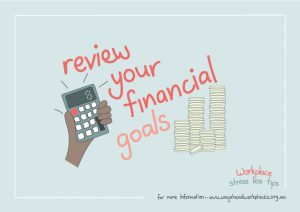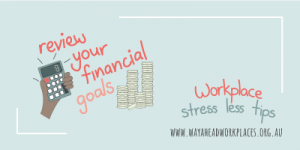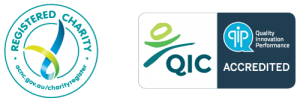
Review your financial goals or set some if you don’t have any
Being in control of our finances and feeling financially secure is important for our wellbeing. Individuals who develop even a rough financial plan experience lower levels of financial stress and those who feel in control of their finances are more confident about their ability to achieve personal and professional goals.
Actions – Individual
Work out your goals
- Go to a website for free information and resources to help you set and reach goals
- Take the LifeValues quiz to determine what you value most
- Consider how much you would have to earn to meet your goals
Set yourself up for success
- Create a budget with clear goals
- Track your spending – via spreadsheet or an app
- Start a savings plan
- Make a plan to pay off your debts
- Make time over the year to check in on your financial goals to maintain a healthy financial life (and reduce stress), eg monthly, quarterly, half yearly
- Automate your savings and bill paying
- Sign up to a financial institution that offers no account fees
- Learn skills to help you negotiate a pay raise, better loan terms, and so on
- Focus on what you can control
Try different approaches to spending and saving
- Consolidate and build your super
- Change one thing you do regularly to save some extra money e.g. buying coffee every day
- Make your lunch at home
- Buy less clothes or shop vintage and second hand
- Only pay for things with cash
- Have a no spending day each week or fortnight
- Challenge yourself to a 30 Day Financial Fast
Actions – Organisation
Engage your staff
- Organise financial wellbeing seminars by experts for all staff to attend or access
- Provide access to resources on financial wellbeing on your intranet, social media or internal newsletters and team meetings
- Give staff wellbeing time to manage their finances (e.g. bank visits, phone calls)
- Check in with staff when they are experiencing life changes that may impact on their finances
- Audit the organisation’s salaries, considering equity across all demographics and positions
Activity ideas
- Simple Ways to Save Money – ASIC’s MoneySmart
- 5 Habits You Can Learn from Financially Secure People – TAL
- 10 Basic Steps – Smart About Money
Research
- Simple Ways to Exploring Financial Wellbeing in the Australian Context – Centre for Social Impact
- Financial Wellbeing: A Survey of Adults in Australia – Australia and New Zealand Banking Group Financial Wellness in the Australian Workplace – AMP
- Findings of the Stress and Wellbeing in Australia Survey 2015 – Australian Psychological Society
- Improving the Financial Wellbeing of Australians – Commonwealth Bank, The University of Melbourne & Melbourne Institute
- The Financial Fitness of Working Australians – Map My Plan
- WSSA Workplace Financial Wellness Index – CoreData Research
Resources
- Barefoot Investor (Website)
- Business, Personal and Family Budget Templates – Microsoft Office
- Calculators & Resources – Australian Securities and Investments Commission’s (ASIC) MoneySmart Finances – Australian Government, Department of Health, Head to Health
- Get Your Money On Track – ASIC’s MoneySmart
- Invest/Financial Planning – HerMoney Media
- Life Events & You – ASIC’s MoneySmart
- Listen Money Matters (Website)
- Managing Financial Stress Effectively – Acacia Connection
- MoneyMinded – Australia and New Zealand Banking Group
- Mozo (Website)
- Sorted (Website)
- Sugarmamma.TV (Website)
- What Does Your Attitude to Money Say About You? – BBC Teach
- Women & Money (Website)
- Women Talk Money (Website)
- Your Financial Wellness (Website)
Downloadables
Click on each image and when it opens, right click and select ‘Save image as…’
A4 individual tip

eSignature
Please hyperlink it with https://workplaces.wayahead.org.au/workplace-stress-less-tips/




